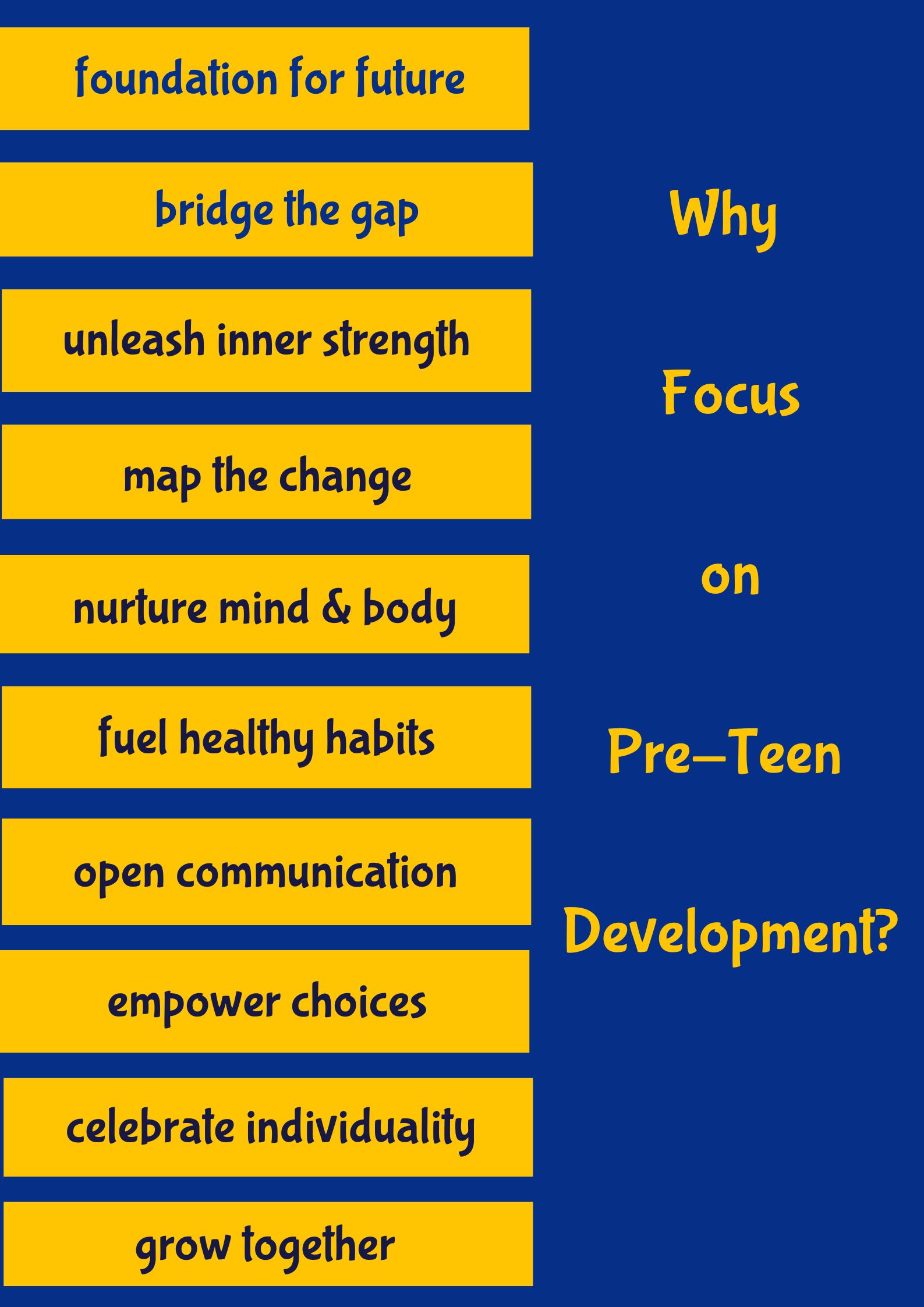What Does Pre-Teen Mean
The pre-teen years, roughly between the ages of 9 and 12, are a period of immense change and development. It’s a time when children transition from childhood to adolescence, and it can be both exciting and confusing for them (and sometimes for parents too!).
Pre-teens are at an exciting and transitional phase, bridging the gap between childhood and adolescence. Typically between the ages of 9 and 12, they’re no longer young children but not quite teenagers either. This period is marked by a desire for more independence. They crave to make their own choices, like picking their clothes or activities, and want to spend time with friends without constant adult supervision. Friendships become a central focus as they navigate social dynamics, loyalty, and group settings. They also started a journey of self -discovery, experimenting with different styles, interests, and personalities to form their own unique identity.
The world starts to look different through their eyes. They become more aware of current events, social issues, and contrasting viewpoints, potentially forming their own opinions. It’s a rollercoaster of emotions due to hormonal changes, leading to mood swings and strong feelings. They might become self-conscious about their appearance and how others perceive them. However, it’s also a time of exploration. They’re open to trying new hobbies, activities, and interests to find their passions. As they mature, they’re entrusted with more responsibility, like managing chores or their time better.
Overall, pre-teens are like sprouts, rapidly growing and changing, or butterflies in a cocoon, preparing to emerge as teenagers with newfound identities and social connections.
Why the Pre-Teen Years are a Foundational Stage for Growth
The pre-teen years, often overlooked between childhood and adolescence, are a period of immense importance. This age group, roughly between 9 and 12 years old (though it can vary), lays the groundwork for the teenager your child will become. Let’s delve into why these pre-adolescent years are so crucial.
Building Blocks of Identity
Pre-teens are on a quest to discover who they are. They experiment with different styles, interests, and friendships, forming their unique sense of self. This exploration is vital for developing a strong identity that carries into their teenage years and beyond.
Brain Power Up
The pre-teen brain is undergoing a significant growth spurt, similar to what happens in early childhood. This period is prime for learning and developing new skills. It’s not just about memorizing facts; it’s about critical thinking, problem-solving, and social experience. Nurturing their curiosity and providing opportunities to learn, you can help them build a strong foundation for future academic and personal success.
Friendship Foundations
Friendships become a cornerstone of a pre-teen’s life. They learn to navigate social interactions, build trust, and develop empathy through these connections. Positive peer groups provide a sense of belonging and support them through challenges.
Emotional Intelligence Takes Root
Pre-teens experience a rollercoaster of emotions. They grapple with self-consciousness, frustration, and newfound independence. This is when they begin to understand and manage their emotions, a skill known as emotional intelligence. By teaching them healthy coping mechanisms, you equip them to handle the more intense emotions of adolescence.
Setting the Stage for Adolescence
The pre-teen years are a dress rehearsal for adolescence. They start to test boundaries, develop decision-making skills, and face the consequences of their choices. This prepares them for the increased independence and responsibility they’ll encounter as teenagers.
Supporting Your Pre-Teen
Understanding the significance of the pre-teen years allows you to provide the right kind of support. Open communication, clear boundaries, and a safe space to express themselves are essential. Encouraging healthy habits, enhance their interests, and celebrating their individuality will go a long way in helping them to explore this crucial phase.

Challenges of Being a Pre-Teen
Being a pre-teen is a time of massive change, and it can definitely be tough. Here are some of the biggest hurdles pre-teens face. These challenges are all normal. If you’re a pre-teen going through this, know that you’re not alone!
Body Image and Changes – This is when puberty starts kicking in, and bodies are transforming. It’s common for pre-teens to feel awkward and self-conscious about these changes.
Social Anxiety and Fitting In – Friendships become super important during this time, and pre-teens can feel a lot of pressure to fit in with a certain group. This can lead to anxiety about being left out or judged.
Emotions on a Rollercoaster – Hormones are all over the place during pre-teens, which can make emotions super intense. Pre-teens might feel happy one minute and then angry or sad the next, and it can be confusing to deal with.
School Pressures – School can become more challenging academically in pre-teen years. There can also be pressure to perform well and get good grades.
Developing Independence – Pre-teens naturally crave more independence, but they’re still figuring things out. This can lead to disagreements with parents and struggles over boundaries.
Decision Making – Brains are still developing in pre-teens, so it can be hard to make good choices. This can lead to risky behavior or poor judgment.
Pre-teen Development
Pre-teens are children between the ages of 9 and 12. It’s a time of significant change as they transition from childhood to adolescence. While puberty usually begins in the later pre-teen years, even before hormonal changes kick in, pre-teens experience a lot of growth and development.
Physical Development
- Pre-teens experience a growth spurt, increasing in height and weight.
- Their muscles become stronger, and their coordination improves.
- Boys may begin to develop broader shoulders.
- Girls’ chests may begin to develop.
Social Development
- Pre-teens become more independent and assertive.
- They crave spending time with friends and forming close relationships.
- They may start to experiment with different social groups and identities.
Emotional Development
- Pre-teens experience a wide range of emotions, which can sometimes feel overwhelming.
- They may become more self -conscious and critical of themselves.
- They may start to develop romantic feelings towards others.
Cognitive Development
- Pre-teens become more logical and abstract thinkers.
- They develop better problem -solving skills.
- They become more interested in hypothetical situations and thinking about the future.
It’s important to remember that every child develops at their own pace. Some pre -teens may experience puberty earlier than others, and that’s perfectly normal.
Helping Pre-Teens – Tips for Parents and Caregivers
Pre-teens can be a delightful whirlwind of independence, newfound emotions, and endless questions. Here are some tips for parents and caregivers to help your pre-teens facing this exciting yet sometimes challenging stage.
Communication is Key
- Active Listening – Put down your phone and truly listen to their concerns, questions, and even rants. Don’t judge, just listen and offer support.
- Open and Honest Conversations – Create a safe space where they feel comfortable talking about anything, from friendships to body changes.
- Indirect Approach – Sometimes direct questioning might shut them down. Try watching a movie together that deals with a similar situation and then discuss it indirectly.
- Focus on “I” Statements – Instead of accusatory statements, use “I” statements to express your concerns. For example, “I feel worried when you stay out past curfew” instead of “You’re so irresponsible!”
Building Trust and Independence
- Don’t Take Their Pushback Personally – Their desire for independence is natural. Pick your battles and allow them to make small choices.
- Set Clear Expectations and Boundaries – Establish clear rules and consequences, but also explain the reasoning behind them.
- Gradual Responsibilities – Give them age -appropriate chores and responsibilities. This teaches them life skills and fosters a sense of accomplishment.
- Respect Their Privacy – While open communication is important, respect their need for some privacy. Knock before entering their room and avoid excessive snooping.
Guiding Them Through the Social Maze
- Know Their Friends and Their Families – Get to know the kids they spend time with and their parents. This can help you assess potential influences.
- Open Communication About Relationships – Talk about healthy friendships, bullying, and respect in relationships.
- Help Them Experience Social Media – Discuss online safety, cyberbullying, and responsible social media use.
- Encourage Extracurricular Activities – Help them find hobbies and activities where they can make friends who share their interests.
Supporting Their Emotional Well -being
- Be a Safe Space for Emotions – Let them know it’s okay to express their emotions, whether it’s happiness, sadness, or anger.
- Validate Their Feelings – Acknowledge their emotions and don’t dismiss them as “dramatic” or “overreacting.”
- Body Image and Self -Esteem – Promote a healthy body image by focusing on their strengths and accomplishments, not just looks.
- Be a Role Model – Show healthy ways of coping with stress and difficult emotions.
There’s no one-size-fits-all approach. Be patient, understanding, and most importantly, show them your love and support.

Dear Parents
Don’t underestimate the power of pre-teen years! They’re like planting a seed – what you do now shapes the strong, confident teen they’ll become. Talk openly and listen patiently. Let them explore who they are while offering gentle guidance. Your love and support are their sunshine for healthy growth!